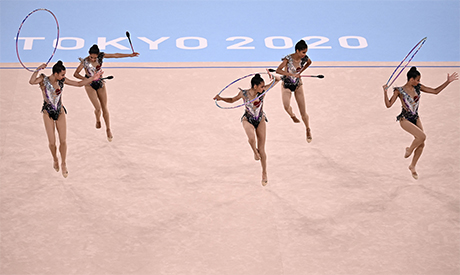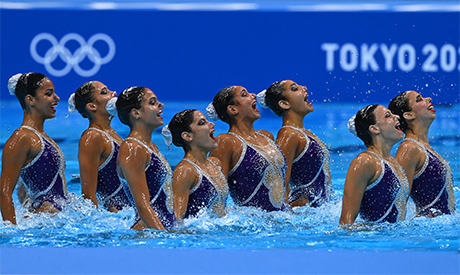Just as it was Egypt’s largest delegation ever in an Olympic Games, so was its harvest of medals. The Egyptians had participated in the 17-day 2020 Tokyo Olympics with a country-record contingent of 134 athletes who competed in 23 sports. After it was all over the Pharaohs ended in 54th place out of 86 in the table after winning six medals: a gold, a silver and four bronze, the most collected by Egypt at any Olympics.
The previous Egyptian record was five medals won at the 2004 Athens Games: one gold, one silver and three bronze.
In Tokyo, Egypt claimed its six medals in four sports: taekwondo, wrestling, karate and the modern pentathlon.
The six were in contrast to the three bronze which Egypt earned at the 2016 Rio Olympic Games.
Egypt started slowly in Tokyo, raking in only two bronze medals in the first week, in the sport of taekwondo, and won by Seif Eissa and Hedaya Malak.
Into the second week and there were no signs of any more medals forthcoming. Hopes appeared dashed until Mohamed Ibrahim, or Kisho, claimed a bronze in Greco-Roman wrestling, followed by another bronze from Gianna Farouk in karate, which had joined the Olympics for the first time.
Egypt left the best for last when two remaining medals came with only one day to go for the Games. Ahmed Al-Gendi claimed a silver in the modern pentathlon and Feryal Ashraf snared the ultimate, the gold medal, in karate. It was Egypt’s first gold medal since wrestler Karam Gaber’s victory at Athens 2004. Before that, Egypt’s last Olympic gold medal was in 1948 in weightlifting.
Egyptian President Abdel-Fattah Al-Sisi said he has invited karateka Ashraf and her parents to perform the Haj. He also said he will name certain junctures in the country after Egypt’s medal winners.
He described Egypt’s first gold medal at the Tokyo Games as “a new achievement to be proud of that confirms the ability of the Egyptians to make achievements in all fields”.
In earlier messages on his official Facebook page, Al-Sisi praised the handball team for their “heroic” performance in the Tokyo Olympics.
Egypt could have won more medals in Tokyo as many athletes were close to the podium, especially the men’s handball team which had made history by making it to the semi-finals, the first time the team had reached such heights. But Egypt lost to France, then lost the bronze to Spain 27-23 for a fourth-place finish.
Greco-Roman wrestler Mohamed Mustafa came in fifth. The men’s sabre fencing team and Omar Assar in table tennis won no medals but shone nevertheless.
Fencer Alaa Abu-El-Kassem, the 2012 silver medalist, was sixth in the men’s foil individual event, while teammates Mohamed Hamza and Mohamed Al-Sayed came seventh and eighth in the sabre. Two athletes and two teams finished eighth in their sport: Mustafa Amr in shot put, Abdel-Rahman Wael in taekwondo, the foil men’s team and the football team.
In Egypt’s first participation in the gymnastics trampoline discipline, Malak Hamza secured ninth place while her teammate Asser Seif came in 10th. Diver Mohamed Mohaymen broke an Egyptian record by finishing 11th in 3m springboard diving. While not making it among the top 12, other Egyptian athletes improved their personal bests.
President of Egyptian Olympic Committee Hisham Hatab said he was satisfied with Egypt’s results in Tokyo.

Artistic gymnastics
“We won six medals and had 14 athletes ranked from fourth to eighth as well as athletes who reached the final stage in some sports like diving, which means that almost 25 per cent of the participating athletes achieved good results. In those athletes, we will invest in and work on preparing them for the next Olympics in Paris 2024. Now they have the experience of the Games,” Hatab said.
“We have a group of athletes who are almost ready for the Paris Games and we are applying scientific methods in the building-up process. Football is the most popular sport in Egypt and so everyone is talking about them now, especially the sport’s experts, because we lost to Brazil who later won the gold medal. I don’t think the football team’s results were negative, but they were unlucky to meet Brazil at this stage,” Hatab, who is also president of the Egyptian Equestrian Federation, added.
Egypt advanced from a tough football group that included Spain, Argentina and Australia before losing 1-0 to defending champions Brazil in the quarter-finals.
The Tokyo Games were supposed to have been held last year but were postponed because of the coronavirus. Throughout the time the pandemic threatened to upend the Games completely and more than once there was talk of having no Olympics at all.
Though all competitions were held without fans in attendance, sports lovers engaged with the athletes and shared their emotional moments of joy and tears in the Games held under the slogan ‘United by emotion’.
Interestingly, team members, coaches, officials and staff served as supporters in the empty stands, cheering not only their teams, but that of neighbouring countries, if of course, they weren’t playing against them.
The absence of foreign visitors hurt the host city, especially in tourism, hotel, entertainment and restaurant sectors. According to Japan’s Nomura Research Institute, these sectors lost more than $1 billion in revenues.
The official price tag for the Tokyo Olympics is $15.4 billion which a University of Oxford study says is the most expensive on record.
Seventeen records were set in Tokyo, in rowing, swimming, athletics, shooting and weightlifting.
Though China was leading the medals table for most gold for most of the Games, the US crept from behind to pip the Chinese one gold better, and finish with 113 medals: 39 gold, 41 silver and 33 bronze. The Chinese came second with 88 medals: 38 gold, 32 silver and 18 bronze medals, while hosts Japan came in third with a total of 58 medals: 27 gold, 14 silver and 17 bronze medals. Great Britain followed in fourth place with an overall 65 medals: 22 gold, 21 silver and 22 bronze medals, whereas the Russians who were playing under the flag of the Russian Olympic Committee as punishment for doping violations, placed fifth with 71 medals: 20 gold, 28 silver and 23 bronze medals.

Artistic swimming
Five new world records were recorded in rowing and three world records in athletics - in the men’s 400m hurdles, the women’s 400m hurdles and in the women’s triple jump. Three records were set in cycling, while six world-record times were set in swimming. Shooting saw one record fall.
The Tokyo Olympics introduced four new sports — skateboarding, surfing, karate and sport climbing.
Altogether 11,000 athletes from 206 countries battled it out in the Tokyo Games at 42 venues around Japan including the northern island of Hokkaido which was chosen to host the final event, the marathon, because of its milder summer temperatures. Athletes competed in 339 medal events, representing 205 national Olympic committees, with one team made up of refugees.
For the Games, the hosts produced 5,000 Olympic medals from 78,985 tons of recycled electronic devices, which included digital cameras, laptops, handheld games and a whopping 6.21 million mobile phones. The Games were the most gender equal ever, with just under half of all athletes competing in women’s events, according to the International Olympic Committee (IOC).
A total 206 countries participated in Tokyo; only 93 won medals.
When the Tokyo Games came to an end with the closing ceremony on 8 August, the Olympic flag was handed over from Governor of Tokyo Yuriko Koike to Mayor of Paris Anne Hidalgo, shifting the world’s attention to Paris 2024. Though it’s almost three years away, it’s never too early for the athletes and their fans to get excited about the Games of the XXXIII Olympics.
In 2024, Paris will become just the second city to host the Olympic Summer Games three times after London which had staged the 1908, 1984 and the 2012 Games. The City of Lights first hosted the Olympic Games in 1900, four years after the multi-sport event was resurrected in Athens after being banned by Roman Emperor Theodosius I some 1,500 years earlier. No opening or closing ceremonies were held at the 1900 Olympics, which featured female competitors for the first time in Olympic history, as well as other unique events including ballooning, underwater swimming and cricket.

Handball
Paris hosted the Summer Olympics again in 1924, becoming the first city to host the Olympics twice and when the Games kick-off in Paris on 26 July 2024, it would mark 100 years for the French capital since the second Games in 1924, marking the third time as hosts. France has also staged the Winter Olympics on three occasions: Chamonix 1924, Grenoble 1968 and Albertville ‘92.
According to the IOC, the 2024 Summer Olympic programme is scheduled to feature 32 sports encompassing 306 events. Among them will be breaking, which will make its Olympic debut. Breaking is a competitive form of breakdancing that includes footwork and athletic moves like back or head spins. Athletes (known as b-boys and b-girls) are judged on a number of criteria during their routines, including technical skill, creativity, style, speed, strength, rhythm and agility. Breaking was a hugely popular event at the 2018 Summer Youth Olympics in Buenos Aires, and in December 2020 the sport was officially added to the programme for Paris 2024 along with surfing, skateboarding and sport climbing, which made their Olympic debut at Tokyo 2020.
*A version of this article appears in print in the 12 August, 2021 edition of Al-Ahram Weekly
Short link: